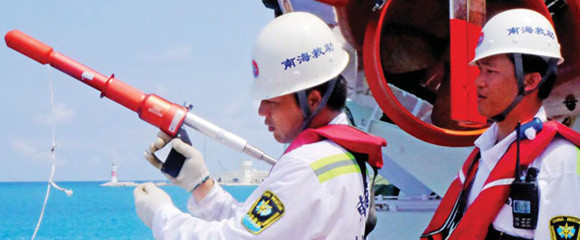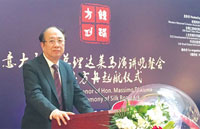G7 summit - hijacked, sidetracked
Updated: 2016-05-27 19:07
(Xinhua)
|
|||||||||
BEIJING - The Group of Seven (G7) advanced economies wrapped up their latest summit in Japan, with the adoption of a declaration suggesting that the rich-country club is being hijacked and is in danger of being sidetracked.
The 30-plus-page declaration mainly dwells on economic issues, including the group's plan to address their economic weakness and global economic recovery.
Yet thrusted in the lengthy development-centered paper is a chapter about G7's "concern" over the situation in the East and South China Seas. None of its member countries, except Japan, is a party directly involved in disputes over the East China Sea.
The very existence of the chapter in the declaration has exposed Japan's self-serving calculation in instigating the G7 into supporting Tokyo's own interests.
Japan's hidden agenda had been laid bare with its intensive diplomatic endeavor, including Japanese Prime Minister Shinzo Abe's recent Europe trip and Foreign Minister Fumio Kishida's Southeastern Asia tour, both of which were restlessly used by Tokyo to hype up the South China Sea disputes.
However, the vaguely written statement, though giving rightist Abe something to gloat over, is some distance away from his original intention of making a big fanfare of the maritime issues at the two-day summit in Ise-Shima.
The G7 had been reluctant to speak for the ill-intentioned host, indicating its desire to stay neural over issues beyond the founding purposes of the group.
Ramming self-serving priorities into agenda of bilateral and multilateral meetings is Japan's notorious stock-in-trade. Its habit of diverting attention to its own interests, regardless of others' concern, has made itself tons of criticism.
More importantly, Japan should be the first to heed the G7's remarks over the maritime issues and reflect on its own flame-stoking moves before urging others to refrain from "unilateral actions which could increase tensions."
In 2012, the Japanese government announced an illegitimate "purchase" of China's Diaoyu Islands, marking the start of a tense situation in the East China Sea. Tokyo's ensuing attempts to reverse its pacifist constitution to send troops overseas have further heightened regional tensions.
While in the South China Sea, Japan has colluded with the United States by making unremitting efforts to increase tensions so as to gain a foothold in the region for their own strategic purposes.
Therefore, the Tokyo-imposed message makes Japan nothing but a thief crying "Stop thief."
The G7, which is wise enough to see through Japan's cheap tricks, should refocus on issues that defines its role as a facilitator to world development. As the G7 members rightly pointed out, "global growth is their urgent priority."
Letting the G7 agenda being hijacked only for the interests of a certain member risks setting the bloc off the track and negatively impacting its potential cooperation with other countries.
Given the group's less representativeness, it is detrimental for the G7 to further deviate from its once economic-heavy priorities.
In order to play a constructive role in promoting global economic development, the G7 needs to keep itself on the right track.
Related Stories
G7 summit proving to be self-serving and divisive 2016-05-27 07:48
China urges G7 to push Asia's economic growth forward 2016-05-27 09:39
G7 leaders mull over global risks at summit 2016-05-27 07:40
Today's Top News
Rescue vessel eyed for the Nansha Islands
Steeled for change
EU has to cope with outcome of British referendum
Four Chinese banks among world's 10 largest
Kiev swaps Russian detainees for Ukraine's Savchenko
Refugees relocated during major police operation
China calls for concerted anti-terror efforts
London's financial centre warns of dangers of Brexit
Hot Topics
Lunar probe , China growth forecasts, Emission rules get tougher, China seen through 'colored lens', International board,
Editor's Picks

|

|

|

|

|

|







